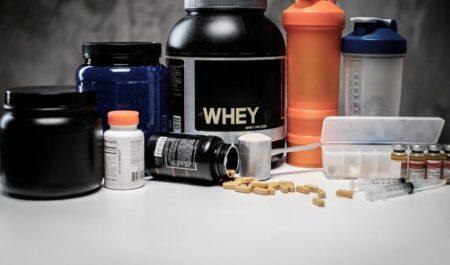Many people, despite the fact that weight loss is a very frequent aim, genuinely wish to put on some weight. Some of the most common motivations for doing so are to improve daily functioning, to appear more muscular, and to improve athleticism. Here are going to explain for you to understand what are the most weight gain pills for females.
Generally speaking, persons looking to gain weight should concentrate on gaining muscle. In most cases, gaining the majority of your weight as muscle rather than fat is preferable.
While food and exercise are the most significant factors in growing muscle, supplements may also be beneficial since they provide calories and protein, as well as the ability to exercise more intensely.
Here are four vitamins that may be able to assist you in gaining muscle.

1. Protein Is Essential.
The majority of individuals are aware that protein is an important component of muscle.
Several studies have found that adults who exercise and ingest protein supplements as part of their diet have a small increase in muscle mass.
Although your overall daily protein consumption is likely more significant than whether it comes from foods or supplements, the latter is likely to be the most critical determinant.
The Institute of Medicine recommends that between 10 and 35 percent of your daily calories come from protein as a general rule of thumb.
An intake of 0.6–0.9 grams (1.4–2.0 grams per kilogram) of body weight per day, according to many scientists, is sufficient to promote muscle growth in physically active individuals.
Taking protein supplements is not necessary if you are able to obtain the recommended amount of protein from natural foods.
The consumption of protein supplements in the shape of shakes or bars, on the other hand, is seen to be a convenient way to integrate more protein into a busy schedule by many people.
One method of determining whether or not you are getting adequate protein without the use of supplements is to keep note of your food intake on a few typical days. You can utilize free resources like as the USDA SuperTracker, MyFitnessPal, or other comparable apps or websites to track your food intake and calories burned.
The fact that consuming a high-protein diet will not cause weight gain unless you consume a sufficient amount of calories overall is also vital to remember.
In fact, some studies have found that high-protein diets can help you lose weight by making you feel more satiated after you eat and causing you to eat less. This may be due to the fact that you eat less overall.
2. Creatine Is A Substance That Helps The Body To Produce More Energy.

Creatine is one of the most well researched supplements available, and it is also one of the few sports supplements that has received extensive scientific support.
This molecule can be found in your cells as well as in some foods in their natural state. It is possible for the creatine content in your muscles to rise beyond and above normal levels when you use a creatine supplement.
Creatine performs a variety of critical activities in your body, including the production of fast energy. A large amount of studies has demonstrated that creatine supplements can boost workout performance as well as muscle gain over the long term.
Creatine monohydrate is the most studied of the several forms of creatine accessible, and it has the most research to back it up as being both safe and effective.
In order to get the most out of creatine, it’s usually best to start with a loading dose of roughly 20 grams per day divided into four portions for 5–7 days.
Afterwards, a maintenance dose of roughly 3–5 grams per day can be taken indefinitely at the rate of around 3–5 grams per day.
3. Weight Gainers Are A Type Of Supplement That Helps You Gain Weight.
In order to acquire weight, you must consume more calories than your body requires for normal functioning to do this. The amount of extra food you have to consume, on the other hand, can vary from person to person.
Weigh-gainers are a large category of high-calorie supplements that are sold to those who are having difficulty gaining weight, such as athletes.
Like protein supplements, there is nothing magical about these nutritional supplements as well. They are simply an easy technique for some people to increase their calorie intake.
Weight gainers are typically protein smoothies that are extremely high in carbs and low in protein.
According to one popular supplement, a serving provides 1,250 calories and contains 252 grams of carbohydrates in addition to 50 grams of protein.
While using weight gainers in your diet will undoubtedly boost the quantity of calories you consume, some people find the flavor and consistency of these products to be unappealing.
Despite the fact that these supplements are convenient when you’re on the go, another option is to simply consume more whole foods, which would also supply additional essential nutrients.
4. Supplements That Help You Perform Better During Exercise.
Very few, if any, supplements have been shown to result in significant weight and muscle gain when taken without exercise.
However, there are a variety of supplements available that may help you exercise more intensely, which may result in greater muscle gain over time.
Caffeine.
Caffeine is commonly consumed in many parts of the world. It is frequently used before exercise by physically active people in order to increase their exercise performance.
Several studies have demonstrated that caffeine is truly beneficial at improving workout performance.
When it comes to sports such as weightlifting, running, and cycling, it can help you boost your power output, which is the body’s ability to generate force quickly.
Exercise that is more difficult as a result of caffeine use may result in greater muscle gain over time. This, however, would only occur if a significant amount of calories and protein were consumed.
Citrulline.
Citrulline is an amino acid that is created by your body and found in a wide variety of foods (19Trusted Source, 20Trusted Source).
One of its tasks is to improve the flow of blood to the tissues in your body.
Several studies have discovered that taking this supplement may result in an increase in the amount of exercise performed in a single session.
Although long-term studies on this supplement is limited, it has the potential to aid in muscle building over time if it permits you to accomplish more total effort while exercising.
Beta-Alanine.
In addition to lysine, beta-alanine is another amino acid that occurs naturally in your body. It can, among other things, assist your muscles in fighting exhaustion while you are exercising.
When taken as a supplement, beta-alanine may aid in the improvement of performance during strenuous exercise that is performed in one- to four-minute bursts, according to research.
Despite the fact that additional research is needed, there is evidence that beta-alanine can help you grow muscle when you are exercising.
HMB.
When the amino acid leucine is broken down in your body, a molecule known as beta-hydroxy beta-methylbutyrate (HMB) is created as a byproduct.
This chemical may aid in the healing process following intensive exercise and may also help to minimize the breakdown of muscle proteins.
While conflicting outcomes have been recorded, HMB supplements have the potential to increase muscle rehabilitation and muscle building, particularly in people who have little or no previous exercise experience.
However, the validity of the studies that demonstrated the biggest advantages of HMB supplements has lately been called into question, and additional research is needed to determine their genuine effects.
Supplements That Are Most Likely Ineffective.
When used in conjunction with an adequate exercise routine, such as weight training, supplements that boost your calorie or protein consumption may aid in muscle growth.
Other supplements that boost your exercise performance can present a more significant stimulus to which your body must respond, increasing the amount of time you spend exercising. Over time, this could result in greater muscle or weight growth.
However, for the majority of supplements, there is no evidence to suggest that they can, on their own, help you acquire weight or muscle mass.
BCAAs.
Branch-chain amino acids (BCAAs) are without a doubt essential for the development of new muscle tissue.
BCAAs, on the other hand, can be found in practically all protein sources. BCAAs are present in almost all protein sources, thus you are almost certainly taking them without even realizing it.
Furthermore, there is no evidence to support the benefits of BCAA supplementation for muscle gain.
Despite their widespread use, these supplements are not necessary for muscle growth if you are eating a sufficient amount of protein.
Testosterone Boosters Are Medications That Increase Testosterone Levels.
The hormone testosterone plays a critical part in the anabolic processes of your body, which are responsible for the development of lean muscle mass.
Testosterone boosters are a large category of products that claim to stimulate the production of this hormone while also promoting muscular growth and strength.
Tribulus terrestris, fenugreek, D-aspartic acid, ashwagandha, and DHEA are some of the ingredients that are typically included in these nutritional supplements.
In general, the majority of these chemicals are unlikely to be effective for raising testosterone or weight gain, as previously stated.
Some of the substances in these items have been found to offer potential health advantages in a small number of studies, but further research is needed to confirm this.
Some of these supplements may be more helpful in men who have low testosterone levels than in healthy guys. No matter how effective they are, testosterone boosters rarely live up to their advertising claims.
CLA.
Conjugated linoleic acid (CLA) is a fatty acid that belongs to a specific category of fatty acids that may have health-promoting properties.
When it comes to the impact of CLA supplements on muscle gain, there have been conflicting reports. Some studies have found minor benefits, while others have found no such benefit.
Plethora of research has also revealed that CLA may help you lose a little bit of weight by promoting fat loss, and it is unlikely to make you gain weight even if you acquire a tiny amount of muscle.

What’s The Bottom Line?
Exercising regularly and eating well are two of the most essential lifestyle factors that contribute to weight growth and muscle mass development.
To be more specific, you must consume more calories than your body consumes and consume more protein than your body can digest.
Some dietary supplements, such as weight gainers and protein supplements, can be a handy approach to help you consume more calories and protein than you would otherwise.
A well-researched substance, creatine, may also aid in weight growth by increasing the amount of energy you burn.
In addition to the above-mentioned supplementation, other substances such as caffeine, citrulline, and beta-alanine may help you exercise harder, so providing a stronger stimulus to which your muscles must adapt.
To acquire weight, you must ensure that your fitness routine and food habits are in order. These will be the most important criteria in determining your level of achievement.
